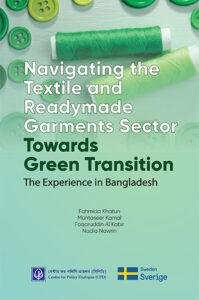 The export-oriented textile and readymade garments (RMG) sector is an important driving force of Bangladesh’s economy, generating employment and foreign exchange. In view of Bangladesh’s graduation from the category of Least Developed Country (LDC) to a developing country in 2026, the textile and RMG sector of the country will need to have a clear strategy for accomplishing environmental and sustainability commitments in areas such as clean energy, carbon neutrality, waste management, robust climate actions vis-à-vis the emerging EU Green Deal, and circular economy frameworks. Against this backdrop, the present study has examined the state of green transition initiatives in Bangladesh’s textile and RMG sector, the associated challenges and the way forward based on evidence collected from primary sources.
The export-oriented textile and readymade garments (RMG) sector is an important driving force of Bangladesh’s economy, generating employment and foreign exchange. In view of Bangladesh’s graduation from the category of Least Developed Country (LDC) to a developing country in 2026, the textile and RMG sector of the country will need to have a clear strategy for accomplishing environmental and sustainability commitments in areas such as clean energy, carbon neutrality, waste management, robust climate actions vis-à-vis the emerging EU Green Deal, and circular economy frameworks. Against this backdrop, the present study has examined the state of green transition initiatives in Bangladesh’s textile and RMG sector, the associated challenges and the way forward based on evidence collected from primary sources.
The study used a mixed approach involving quantitative and qualitative tools and techniques. A primary survey was conducted among the owners, managers, workers, and supervisors of 403 factories in the textile and RMG sector. Additionally, 4,541 workers and supervisors were interviewed from the aforementioned factories to collect information regarding workers’ knowledge and perception of green practices and the impact of green practices on the workers’ health and productivity.
The study finds four significant types of barriers that the textile and RMG factories face in green transitioning: policy and regulatory barriers, institutional barriers, factory-level barriers, and market-related barriers. The policy barriers include a lack of harmonisation in policies and regulations, an absence of specific environmental goals in policies and regulatory frameworks, and regulatory and policy uncertainty for energy security. The institutional barriers identified are weak regulatory, management, monitoring systems, and enforcement, and a lack of coordination among government agencies. The key factory-level barriers to green transition include lack of awareness, limited technological capacity, limited access to finance, and limited use of water and electricity from sustainable sources. Lastly, the market-related barriers to green transition are a lack of market-driven incentives and a lack of information and expertise on green technologies.
Authors: Fahmida Khatun, Muntaseer Kamal, Foqoruddin Al Kabir, Nadia Nawrin
Publication Period: October 2024


